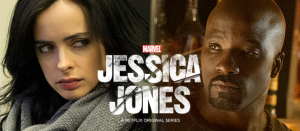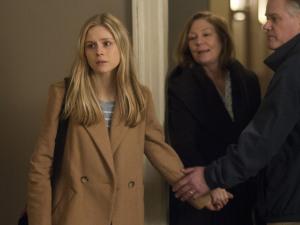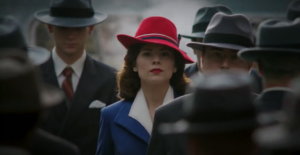I don't completely love Jessica Jones' first 3 episodes, and I don't entirely know why.
But, first, some housecleaning: I am not going to do episode-by-episode reviews of this show, both for time considerations and because I don't feel like it is designed for that kind of analysis. However, I'm not going to simply watch all of it and offer a review of the entire series, like I did with The Unbreakable Kimmy Schmidt. I am a habitual binge-watcher, but lately I am trying to limit to it more bite-sized pieces in order to savor the taste a little more. So, I will review Jessica Jones in a series of "Binge-Watcher's Diary" entries.
WHAT WENT DOWNJessica takes a case tracking down a missing Omaha girl named Hope and freaks the fuck out when this girl turns out to have been victimized by Jessica's old psychological tormenter, the hilariously named Kilgrave, very much so not-dead, contrary to what everyone had believed. He has the power to mind control anyone merely through the sound of his voice, and if you don't know anything about the comics he's a total mystery.
Oh, yeah, also - Jessica has sex with Luke Cage. A lot. No "Captain America might be a virgin" jokes for this wing of the Marvel Cinematic Universe. Well, the characters on the show might make those jokes, but we won't make those jokes about any of them.
Wait, back up. Who even is Jessica Jones? What kind of person is she? What's her background? Am I supposed to know who "Luke Cage" is?
 Jessica is the type of badass who will forcefully tell her annoying neighbors to pipe down when they're making enough noise to wake the entire apartment complex, but she's also the secretly caring person who will habitually stand up to anyone messing with a sweet-natured drug addict who lives in her building. Wherever she lives looks like it's literally one block around the corner from Matt Murdock and Foggy Nelson's law firm on Daredevil.
Jessica is the type of badass who will forcefully tell her annoying neighbors to pipe down when they're making enough noise to wake the entire apartment complex, but she's also the secretly caring person who will habitually stand up to anyone messing with a sweet-natured drug addict who lives in her building. Wherever she lives looks like it's literally one block around the corner from Matt Murdock and Foggy Nelson's law firm on Daredevil.
As for her background, after an as-yet unexplained accident Jessica got some super powers, specifically super strength and leaping moderate-sized buildings in a single bound, but when she tried to be a do-gooder it didn't go so well. Now, she talks (through rather sporadic voice-overs) and behaves like a modern film noir detective (equipped with atmospheric saxophone music), which makes sense because she has her own private detective agency through which she's mostly hired to take pictures of cheating spouses. She consistently gets work from a local law firm run by Carrie Anne-Moss, who, irony of ironies, turns out to be cheating on her own wife (because infidelity is not exclusive to heterosexuals) with her young, busty secretary.
As Jessica puts it at one point, sometimes she allows herself to care, and Kilgrave knows that and will use it against her in his quest for vengeance (she left him for dead, he' pissed), specifically attempting to assassinate her kind-of best friend Trish, who boldly antagonizes him on her radio show. However, through some sleuthing Jessica thinks she's isolated Kilgrave's weakness, specifically that a surgical anesthetic briefly robs him of his powers, which sounds like a perfectly logical solution which will somehow turn out to be complete shite because we've all seen TV before and know how these things typically go.
And, no, you're not really supposed to know who Luke Cage is. Everything in this show is being drip-fed to you (we don't see Kilgrave until the end of the third episode, characters with tortured backstories are in no rush to explain those backstories to us). If you know the comics, you get what they're doing, and, if not, you're supposed to be hooked by the mystery. In this show, Luke Cage is just some bartender who also has superstrength, and Jessica has been following him because when she was under Kilgrave's mind control she killed his wife. Now, she's bonded with him over their shared secret (i.e., that they both have powers) and enjoyed some thoroughly bed-breaking sex, but she can't bring herself to fess up about his wife. After Trish is attacked by a brainwashed police officer, Jessica is further concerned about harming anyone else around her. So, she pushes Luke away, and he knows she's pushing him away for unknown reasons, merely declaring "do what you got to do."
WHAT I THOUGHT There have been some especially haunting moments along the way, particularly when Hope shot her parents in cold blood due to Kilgrave's brainwashing and then screamed in horror once she realized what she'd done (shades of Sharon Carter and Captain America). Plus, the fight sequence between the cop, Trish and Jessica was a conceptual treat. I don't know if the show has quite nailed making Jessica's super strength look believable. Sometimes, people reacting to being hit by her look like WWE wrestlers taking ultra-obvious flops, and other times the camera angles just make it look fake. However, I loved every second of the fight with the cop.
There have been some especially haunting moments along the way, particularly when Hope shot her parents in cold blood due to Kilgrave's brainwashing and then screamed in horror once she realized what she'd done (shades of Sharon Carter and Captain America). Plus, the fight sequence between the cop, Trish and Jessica was a conceptual treat. I don't know if the show has quite nailed making Jessica's super strength look believable. Sometimes, people reacting to being hit by her look like WWE wrestlers taking ultra-obvious flops, and other times the camera angles just make it look fake. However, I loved every second of the fight with the cop.
Ultimately, though, at this point I feel like the show should be called Kilgrave instead of Jessica Jones, for even though he's not on screen that much he is the one tying all of this together. As The Hollywood Reporter's Daniel Feinberg argued:
"If Jessica Jones has a serious flaw in the early-going, it's that, as intriguing as Kilgrave is, the show shares Jessica's monomaniacal fixation on the character, and the result is a sort of narrative claustrophobia. Even Jessica's interest in the man we quickly learn is Luke Cage is Kilgrave-related. Trish becomes part of Jessica's Kilgrave fascination [...] Everything in these opening episodes ties back to Kilgrave, and Kilgrave is such a twisted figure that it's hard for any light to get in."
Daredevil similarly devoted its early episodes to building up the legend of Kingpin by holding him back as the great unseen menace feared by all, but it at least had slightly more episode-of-the-week moments where we saw Matt and Foggy work some cases and Karen doing her own thing. Jessica Jones reminds me more of Ash vs. Evil Dead over on Starz, which is not a TV show - it's a long horror movie being cut up into 30 minute segments. Jessica Jones has the same feel to it, except can a Netflix series really be criticized for embracing an almost entirely serialized format? Not if it's done right, and Jessica Jones is certainly an engaging viewing experience. I wouldn't necessarily call it "entertaining" because that seems like the wrong word for a show which, once you strip away the allegories, is a pretty much about a group of sexual assault victims banding together to take down their attacker/stalker.
It's certainly more mature territory for the genre. It's also the most decidedly feminist thing I've ever seen in superhero TV or film, as the AV Club pointed out, "It should be said: Jessica Jones is a deeply feminist show, all the way down to its depiction of sex, which is pointedly empowering for the women. More than that, its central conflict is its lead character struggling to maintain her agency against an abusive man. All the people in positions of power (minus Kilgrave) are women." However, because everything that has gone on in this show has been in reaction to Kilgrave I find it all a tad suffocating.
Maybe I wanted Angel: Season 1 (when it was vampire noir) and instead I got something closer to a feminist mash-up of Law & Order: SVU and Daredevil. Maybe it's a personal preference thing. I always liked Angel (the show about masculinity) more than Buffy the Vampire Slayer (the show about femininity) because I personally felt closer to Angel than Buffy Summers. Maybe my recent fandom for Agent Carter doesn't mean I've turned a corner but instead that I just really, really love Hayley Atwell as Peggy Carter, in a way that I don't with Krysten Ritter as Jessica Jones even though I can't point to any flaw in her performance.
THE MCU & FEMINISM IN THE ROOM Now that I've mentioned it, one of the hard things to do with Jessica Jones is to talk about it without bringing up Agent Carter, Daredevil, Agents of SHIELD or any of the Marvel movies. Based upon the reviews I've read, everyone seems to be doing it, as am I, having already invoked Daredevil and Agent Carter. For example, The Verge argued, "But no matter what trauma they experience, the women of Jessica Jones are all consistently portrayed as either having control of their lives or working hard to regain it. No Marvel Studios property - not even Agent Carter - has ever done that so effectively, and after months of seeing a character like Black Widow be sidelined by her male counterparts, this is a breath of fresh air."
Now that I've mentioned it, one of the hard things to do with Jessica Jones is to talk about it without bringing up Agent Carter, Daredevil, Agents of SHIELD or any of the Marvel movies. Based upon the reviews I've read, everyone seems to be doing it, as am I, having already invoked Daredevil and Agent Carter. For example, The Verge argued, "But no matter what trauma they experience, the women of Jessica Jones are all consistently portrayed as either having control of their lives or working hard to regain it. No Marvel Studios property - not even Agent Carter - has ever done that so effectively, and after months of seeing a character like Black Widow be sidelined by her male counterparts, this is a breath of fresh air."
Maybe this is naïve of me, but I wish we didn't have to think of Jessica Jones in those terms. Do we have to define it in opposition to what it's not? This is a show which is very much so trying to be its own thing, albeit with one or two references to The Battle of New York in Avengers or the mere existence of The Hulk. Black Widow's unfortunate speech about her past in Age of Ultron shouldn't inspire me to enjoy Jessica Jones even more just because it handles gender better - come on, Avengers and Jessica Jones only very technically exist in the same universes. However, you can't ignore the fictional or real-world context of Jessica Jones, and the fact that it is Marvel's first female-led property beyond Agent Carter is going to garner plenty of attention as is the fact that it has been brought to us by a female showrunner (Melissa Rosenberg).
And I do like it...I just don't really love it. As with the Jessica Jones character, I can sense greatness lurking beneath that gruff exterior. Now that she's finally come face-to-face with Kilgrave at the end of episode 3, I am curious to see where this goes, knowing that it's most likely that across these three episodes I've already seen everything this show is going to be about. Now it's a matter of seeing how it all plays out. Until next time...

